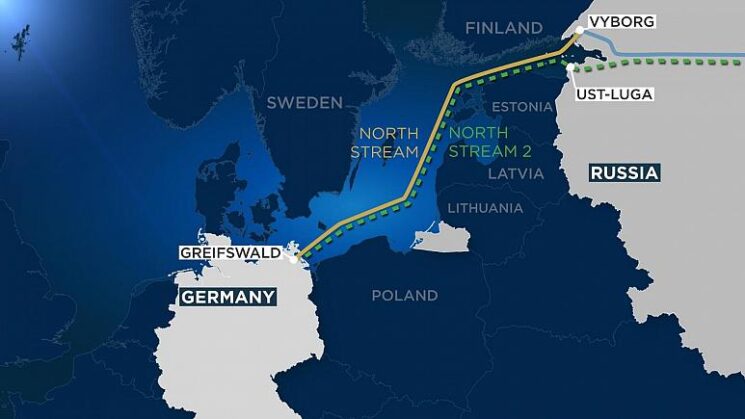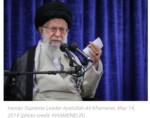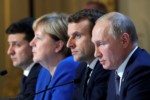It has been a very bumpy road for U.S. relationships with its allies over the past several years and there is no shortage of opinion on how to fix what is seriously broken. Taking allies for granted and subjecting them to public castigation did not start with the Trump administration, although one can argue we have hit new lows with the troop pullout from Germany. These alliances cannot be fixed by random ideas that might put a bandage on the problem, while at the same time giving Moscow a pass on bad behavior in the process. But that is exactly what many have recommended in regards to Russia’s Nord Stream 2 pipeline, just the latest salvo for Russia to dominate the European gas market for years to come.
Under the guise of protecting Germany from any further U.S. animus, commentators and pundits are lining up in opposition to new congressional sanctions that would seek to prevent Russia from finishing a pipeline that is anathema to energy diversity and the economic well-being of Ukraine and members of the European Union. The very bipartisan Nord Stream 2 sanctions legislation working its way through Congress is motivated by recent history, notably Russia’s appalling track record in Ukraine and elsewhere in Eurasia.
But this is not just an us versus them scenario. Rulings by the EU General Court have decreed that Russia’s ownership of both production and pipelines flies in the face of EU anti-monopoly regulations. Even the German energy regulator, the Bundesnetzagentur, rejected Gazprom’s (Russia’s energy giant) application for relief from anti-monopoly rules on the ground-based part of the pipeline in Germany. These obstacles, like so many other rules, regulations and laws in the EU and the United States are but challenges for Russian President Vladimir Putin.
The advocates of pleasing an ally by permitting the completion of Nord Stream 2 prefer not to pay attention to one critical fact. Their position makes it easier for Putin to continue his assault on Ukraine. Lest anyone forget, it was never enough for Russia to just invade and occupy Ukraine. Putin likes to mete out long-term suffering and Nord Stream 2 and Turk Stream are for him a way to punish Ukraine economically for years to come. Many have also bought into Putin’s time-worn narrative that U.S. sanctions are designed to force U.S. liquefied natural gas into the European market. U.S. LNG is already being sold to a number of European countries both in the EU and to Turkey. Would Russia like to force out its competitors, absolutely, but this goes far beyond just the United States.
Russia already controls about 40 percent of the European gas market, which will only increase with the completion of Turk Stream. When and if both Nord Stream 2 and Turk Stream are completed, almost 70 percent of all Russian fossil exports will be sold to the European market. The political and economic implications of both pipelines are far reaching. Despite the five-year transit agreement between Russia and Ukraine, Russia has already significantly slowed gas transit through Ukraine. Deliveries to Bulgaria and Southeastern European markets previously transited Ukraine and Romania but now are routed via Turkey to Bulgaria, Serbia and Hungary. This combined with the massive decrease in gas pipeline transit through Belarus and Ukraine shows that Putin is already achieving his goals.
Germany imports more than one-third of its gas supplies from Russia. But in light of lessening manufacturing demand and conversion to renewables it is unlikely German gas consumption will continue to grow. Only a small percentage of Nord Stream 2 gas is envisaged to stay in Germany with most transiting to other European countries. German businesses associated with the pipeline stand to earn substantial profits as the entry point provider and originating transit country. This is less about geopolitics and more about money.
Few would argue against repairing critical relationships. But achieving that lofty goal by giving Putin free reign to spread Russia’s malign influence throughout Europe is not the best way to accomplish it. Dependence on Russia has cost the Europeans dearly in the past, and Russia, unlike those opposing new sanctions, knows this is so much more than just a business deal.
But the tide may finally be turning. Many German politicians, some longtime opponents of the pipeline and others new in their opposition, along with other EU officials, have come to recognize that the only country that will benefit from Nord Stream 2 is Russia. There is growing consensus that Europe must find a way to convey outrage that has real consequences. And shutting down Nord Stream 2 for good would qualify as a very real consequence.
Debra Cagan is a former Deputy Assistant Secretary of Defense. John Herbst is the director of the Atlantic Council’s Eurasia Center and is a former U.S. ambassador to Ukraine.
The original article can be found @MorningConsult






Leave a Reply